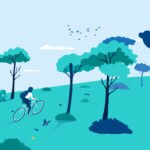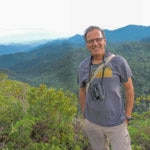Pedro Jordano: "60 percent of infectious diseases in humans come from our relationship with the environment"
In many ways, the coronavirus crisis marks a turning point in human behavior. One of the lessons this pandemic is teaching us is the essential need to change the way we interact with nature. “We will open the door to new pandemics if we continue maintaining a toxic relationship with nature,” states the ecologist Pedro Jordano. For the secretary of the jury for the BBVA Foundation Frontiers of Knowledge in Ecology and Conservation Biology, biodiversity “works like a shock absorber”. If it is altered, “it leads to all kinds of problems,” like the spread of COVID-19.

A research professor at CSIC in the Integrative Ecology Department at the Doñana Biological Station, Pedro Jordano is part of the multidisciplinary working group advising Spain’s Ministry of Science and Innovation on scientific matters related to COVID-19. The ecologist urges for the need to revise humans’ “toxic relationship” with the environment to protect us from future epidemics: “If all infectious diseases that affect humans are reviewed, 60 percent come from zoonosis - that is, viruses going from animal species to humans - and each of them has to do with problems in our relationship with the environment.” Deforestation, poaching, illegal hunting of wildlife, overuse, or agriculture and livestock systems are some of the problems to which he is referring. “They are situations in which there is an imbalance in human beings’ relationship with the environment, or the way we use natural resources,” he says.
An example of this imbalance is COVID-19, as everything suggests that it originated in bats. “Based on what is known about the genetic sequence of this virus and it evolutionary relationship with other coronaviruses of the same family, the closest are bat viruses and other groups of mammals like pangolins. At the same time, several studies have confirmed that it does not have the characteristics of an artificially fabricated viruses. Therefore, it does not seem that an artificial origin is a plausible hypothesis,” he notes. From this perspective, and taking into consideration that global trade of pangolins is enormous and takes place in fresh markets, the hypothesis is reinforced.
Closing the doors on the pandemic
If this theory is confirmed, the immediate response could be a demonization of the species of origin, considering it a source of risk to the population. “This would be a serious mistake, based on a mistaken diagnosis. The problem is not bats ‘per se’, rather human activity in relation to these species,” he argues. Jordano insists on “reconsidering our own behavior in nature and regulating our actions instead of eradicating a species” that is fundamental for the pollination of flowers, the dispersal of plants, or due to its contribution as a regulating factor on insect populations.

Pedro Jordano - Fundación BBVA
The ecologist is more in favor of closing the doors on the pandemic: “These doors open when our actions have absolutely devastating effects on ecosystems, and for this reason, we should think about how we can use natural resources in a much more sustainable way.” Jordano associates the door of this specific pandemic to the trade of fresh meat in countries where it is not regulated and whose supply often comes from the illegal hunting of wild animals. “This illegal hunting is not extractive. I am not referring to indigenous communities’ subsistence hunting, but to the real mafias of international organized crime that extract millions of tons of wildlife, which then goes to fresh meat markets in cities in different countries,” he explains.
International trade does not currently have instruments to regulate its sale. “We would have to expand the Convention on International Trade in Endangered Species of Wild Fauna and Flora (CITES) so that these situations of poaching and illegal fresh meat markets can be pursued, as they are the real open doors to pandemics. Without a doubt, they could provoke similar situations in the future if we don’t close them,” he says.
Jordano understands that efforts should be geared toward these series of international agreements - for trade but also for actions against climate change, and research. “From the point of view of the ecology of the disease, one of the most priority aspects right now is advancing the very limited knowledge we have on the natural biodiversity of viruses and pathogens that have the potential to hurt humanity,” he explains. Regarding the ecology of the disease, the expert speaks of the need to make progress in “understanding well the mechanisms by which the virus spreads” and “understanding the immune reactions in response to the infection processes.” Finally, he calls for the help of the mathematics community to analyze the dynamics by which virus spreads, and to identify the contagion hot spots in a complex network of human relations.
“We need decisive support for science and that cannot be improvised. It has to be action that is established and sustained over time,” he stresses. Jordano believes that science is showing an example of global collaboration with which “we are learning more and more, and generating knowledge very quickly and efficiently” about a virus that was completely unknown several months ago. “Spectacular advances are being achieved with this collaborative work. But it isn’t starting from scratch: it is only possible with very well trained, equipped and well supported research teams,” he concludes.